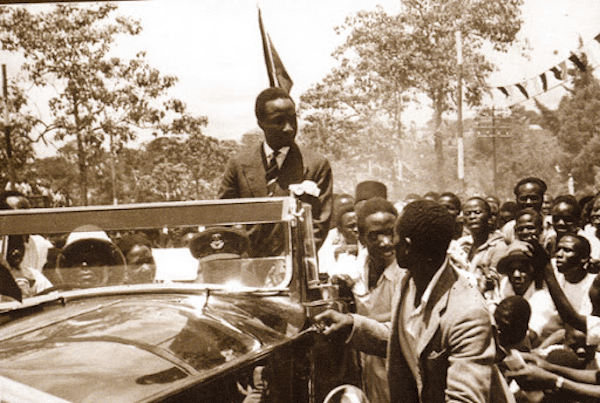In 1955, The Signing Of The Buganda Agreement. — On Tuesday, October 18th, 1955, the day after his triumphal return from exile in England, Mutesa II, the Kabaka of Buganda, formally signed the new Buganda agreement. This was the last link in the chain of events which enabled the Kabaka to again be firmly established as ruler of Buganda, one of the four provinces of the Uganda Protectorate.
Let’s drive back the events that led to the exile of kabaka Muteesa II.. On November 30, 1953 Kabaka Mutesa II, was disposed as the 35th Kabaka of Buganda and deported to the United Kingdom by the colonial governor, Sir Andrew Benjamin Cohen, in an action that shocked the country.

Two years later, the 29-year-old Mutesa II triumphantly returned to his throne to a tumultuous welcome. In a speech on the occasion of the signing of the new Buganda Agreement, Sir Andrew Cohen was jubilant and referred to the experience of the previous two years as beneficial to everyone.
Indeed, a lot was learnt and achieved by both sides from the Kabaka’s indisposition. For example, in a case filed on the initiative of the delegation which was sent to London to fight for the Kabaka’s return, the High court of Uganda held that the governor had no power to dethrone the Kabaka and that a new Kabaka could only be elected according to Buganda’s customs.

The governor had acted on the assumption that clause 6 of the Buganda Agreement of 1900, which provided that as long as the Kabaka cooperated with Her Majesty’s government in the administration of the kingdom, he would be given recognition by Her Majesty’s government as ruler of the kingdom.
Many modern commentators have blamed the Kabaka’s exile on Buganda’s secessionist tendencies, but this cannot be further from the truth. According to records we have reviewed, the word “secession” was first used in a resolution that was passed by the Lukiiko on August 30, 1960, and has never been used in any official document since then.
To understand the true reason for the exile, one must go back in history. Before 1900, Buganda signed two agreements with the Imperial British East Africa Company in 1892 and 1894 for her protection by Her Majesty’s government.
During these agreements, there was a lot of instability in the kingdom caused by religious wars, the Nubian mutiny, not to mention the unpredictable behaviour of Kabaka Mwanga. A lot of Indians, Arabs and Nubians who had been recruited by various parties became unruly once the missions were completed.
The lukiiko had turned into a bickering chamber and the kingdom had been divided into two parts with Bufo for Catholics and the rest for Protestants and Muslims.
This situation caused a lot of concern in London so much that the British government decided to send out an official, Sir Harry Johnson, to come to Uganda to negotiate an agreement/constitution.
The result of Sir Harry Johnson’s work was the Buganda Agreement of 1900, which set up new administrative structures in Buganda and was signed two years before the Uganda protectorate was formed.
CLAUSE 6 OF THE AGREEMENT PROVIDED:
“So long as the Kabaka, chiefs, and people of Buganda shall conform to the laws and regulations instituted for their governance with Her Majesty’s Government and shall co-operate loyally with Her Majesty’s Government…….
Her Majesty’s Government agrees to recognize the Kabaka as the native ruler of the province of Buganda under the protection of Her Majesty’s Government”
Clause 11, on the other hand, provided that “…….the functions of the lukiiko will be to discuss matters concerning the native administration of Buganda and to forward to the Kabaka resolutions which may be voted by the majority regarding measures to be adopted by the said administration.”
In view of the above provisions of the agreement, the Kabaka felt obliged to consult the lukiiko on all matters regarding the administration of the kingdom.
Accordingly, when the governor asked him to sign a document, which in effect gave consent to creation of an East African Federation along the lines of the Central African Federation, he asked the governor to give him time to consult the lukiiko first but the governor saw this as disobedience and withdrew recognition and deported him.
When the protectorate was formed on August 11, 1902, Uganda was not a country as such and it fell upon the governor to create administrative structures for the new country.
The governor was authorized to divide the protectorate into four provinces and the necessary number of districts. The status of Buganda as one of the four provinces was the cause of the misunderstanding between the lukiiko represented by the Kabaka, and the governor in 1953.
Clause 3 of the Buganda Agreement 1900 provided: “The kingdom of Buganda in the administration of the Uganda protectorate shall rank as a providence of equal rank with any other province.
This status was threatened or left ambiguous by a speech by the colonial secretary, Mr Oliver Lyttelton, which he made to the Royal Geographical Society in London in June 1953.
In that speech, the colonial secretary indicated that the British Government intended to create an East African Federation along the lines of the Central African Federation which was dominated by whites.
The reaction in Buganda to the colonial secretary’s speech was swift. The speech raised issues such as: will the Kabaka remain the ruler of Buganda in a wider setting? Will it remain a single unit as per the 1900 Agreement?
The Buganda lukiiko set up a committee to formulate Buganda reaction and came up with briefs for the Kabaka to use in his interactions with the governor.
I know this for a fact because my father, E.M.K. Mulira, drafted all the briefs, which the Kabaka used in his inconclusive meetings with the governor. As soon as news of the Kabaka’s deportation broke, the lukiiko was summoned and in a session held on December 4 1953, passed three resolutions.

These were: Mutesa II was still the Kabaka of Buganda, secondly that as long as Mutesa lived, no other Kabaka would ever be elected and, lastly, that the lukiiko should send a delegation to London to lobby for Mutesa’s return.
A delegation of four composed of Matayo Mugwanya, Buganda’s Chief Justice; Apollo Kironde, lawyer; Thomas Makumbi, a teacher and former contemporary of Mutesa at Cambridge University; and E.M.K.Mulira, a newspaper proprietor. Amos Sempa acted as secretary to the group.

The work of the delegation in London resulted in a new constitution and agreement for Buganda, the return of the Kabaka after two years in exile and a date for Uganda’ self-government being set for 1961. Mutesa’s exile bore fruits for Buganda and Uganda as a whole.



